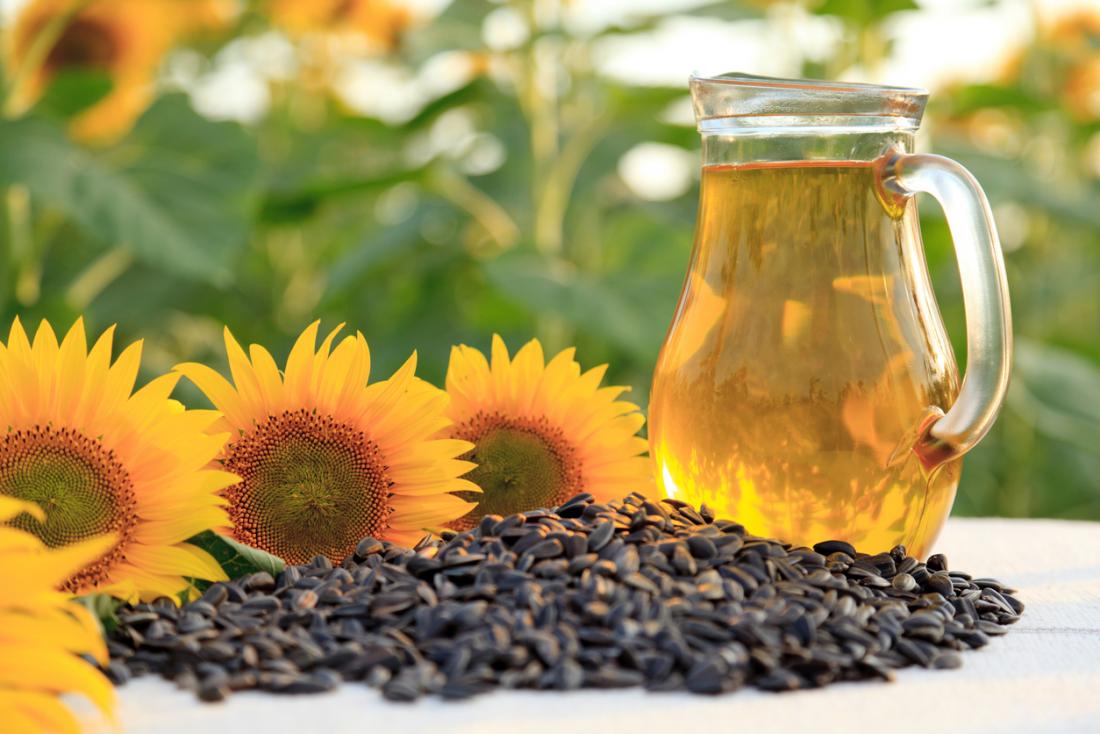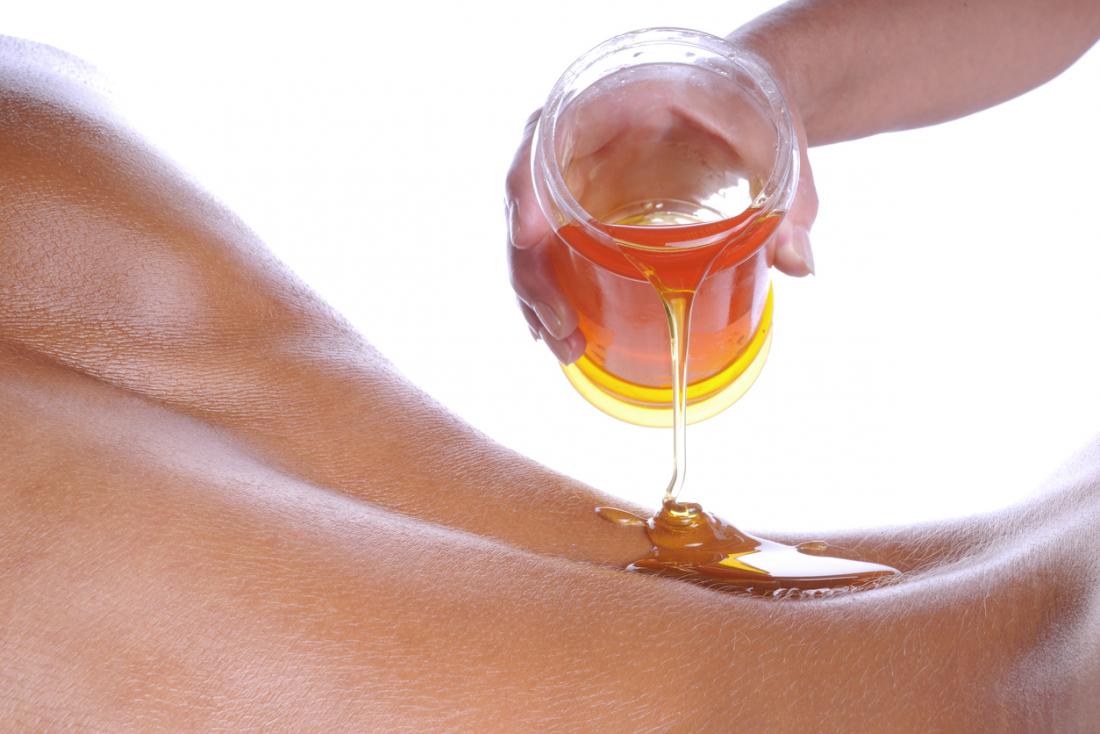Dry skin, also called xerosis, is skin that lacks moisture in its outer layer. If left untreated, dry skin can crack and become infected. Keeping dry skin moisturized is important, but some store-bought treatments can be expensive or ineffective.
This article explores home remedies for dry skin and looks at the scientific evidence behind the claims.
Home remedies for dry skin

Studies suggest that sunflower seed oil may be used as a moisturizer.
There are a variety of home remedies a person can use to relieve dry skin. Most of the treatments below can be used as moisturizers unless otherwise stated. The best way to use a moisturizer is to apply it liberally to damp skin after a bath and let it soak in.
1. Sunflower seed oil
A 2013 study found that sunflower seed oil improved hydration when used as a moisturizer on participant’s arms.
The same study found that olive oil actually damaged the skin’s barrier, suggesting not all natural oils are suitable for use as moisturizers.
2. Coconut oil
Another natural oil that works well to treat dry skin is coconut oil. A 2014 study found that coconut oil is as safe and effective as petroleum jelly for treating dry skin. It was found to significantly improve skin hydration and increase the number of lipids (fats) on the surface of the skin.
As 2016 research explains, coconut oil contains saturated fatty acids that have emollient properties. An emollient is a fat or oil that acts as a moisturizer by filling in gaps in dry skin, making it smooth.
3. Oatmeal bath
Oatmeal is another natural ingredient that can help treat dry skin. Adding powdered oatmeal to a bath or using creams that contain oatmeal may help to relieve dry skin.
A 2015 study found that extracts from oatmeal had anti-inflammatory and anti-oxidant properties, suggesting it can help treat dry skin.
Milk could also offer relief from dry skin, but not when applied to the skin. Research from 2015 suggests that a diet including milk could improve dry skin.
The study found that a fat contained in milk, called phospholipid, improved the skin barrier in mice when added to their diet. More research is needed to see if drinking milk has the same effect on skin in humans.
5. Honey
A 2012 review of research notes that some studies have shown honey to be beneficial for many types of skin diseases.

Some studies suggest that honey may be used as an at home treatment to relive dry skin.
Various studies have found honey to be:
- moisturizing
- healing
- anti-inflammatory
These are all qualities that suggest honey is an ideal at home treatment to relieve dry skin. It is completely natural and can be applied directly to the skin.
6. Petroleum jelly
Petroleum jelly, otherwise known as mineral oil, has been used as a moisturizer for years.
In 2017, researchers found that the skin barrier in older people improved after they used petroleum jelly. This finding supports the use of petroleum jelly to treat dry skin, especially when caused by aging.
7. Aloe vera
Aloe vera gel may help provide relief from dry skin, according to a 2003 study.
A person with dry skin on their hands or feet can apply aloe vera gel and cover the affected area with a sock or glove. People may prefer to do this before they go to bed and leave the gel on all night.
If dry skin is on another area of the body, applying aloe vera gel liberally and allowing it to soak in may achieve a similar effect.
Prevention

Moisturizing regularly after washing may help to prevent dry skin.
Applying emollients and moisturizers regularly after bathing helps prevent dry skin. People can also prevent dry skin by avoiding things that may trigger dryness or irritation, including:
- scratching their skin
- excessive air conditioning
- shaving using a blunt razor or without shaving gel
- bathing or showering too often
- rubbing skin too hard when towel drying
- bathing or showering in water that is too hot
- using lotions that contain alcohol
- wearing clothes that rub the skin
- frequent contact with detergents
- sitting under direct heat from a heater or fire
- staying outside in windy conditions without covering the skin
When to see a doctor
If environmental factors or aging is not the cause of dry skin, a person may have an underlying skin condition. If a person suspects this is the case, then they should speak to a doctor.
If home remedies and store-bought moisturizers do not alleviate the symptoms of dry skin, a person may also wish to speak to a pharmacist about over-the-counter treatments.
It is important to keep skin moisturized and to treat dry skin as soon as possible. If left untreated, dry skin can lead to:
- red patches
- bleeding
- bacterial infection
Redness, swelling, or pus may indicate a bacterial infection. If a person suspects their skin has become infected, they should see a doctor as soon as possible.
How do I get rid of my dry hands?
Dry hands are very common and triggered mainly by environmental influences. People who wash dishes frequently or live in a cold, dry climate may be more prone to experiencing painful dry hands than other people.
Dry hands are primarily caused by the following:
- weather
- environmental irritants
- medical conditions
Weather is responsible for dry hands that mainly occur in the winter. When the weather turns cold, the air dries out, and the body cannot hold onto to moisture. The lack of moisture in the air causes dry skin and hands.
People, such as doctors or nurses, who wash their hands a lot or use hand sanitizer multiple times a day, are more likely than some other people to have dry hands. Others, such as dishwashers or hair stylists, may also be more prone to dry hands due to repeated exposure to chemicals and soaps.
Some people may experience the skin on their hands drying out due to an underlying medical condition.
Individuals with conditions, including diabetes or lupus that affect blood flow to the extremities, may have dry hands. Similarly, other diseases that affect the skin, for example, psoriasis and eczema, can cause dry skin on the hands, as well as skin that peels and cracks.
11 home remedies

A person can try these remedies as a first line of treatment for dry hands:
1. Use moisturizers
Many moisturizers are designed for the hands and are available commercially. A person should use a moisturizing cream on their hands after every wash to help restore the natural moisture to the skin. There are also several oils, such as coconut oil, that may produce similar results.
2. Protect the skin
The sun can dry skin out, cause burns, and lead to other, more severe health problems. All areas of the body should be protected from prolonged sun exposure, and the hands are no exception. Protecting the hands with a quality sun block can help prevent the sun from drying them out.
3. Try overnight treatments
People with extremely dry hands may want to try to treat them overnight. To do this, they should use copious amount of moisturizing lotions or creams. Once they have applied lots of cream, a person should put socks, gloves, or mittens over the hands. The coverings help to keep the moisturizer in touch with the skin, so it is absorbed overnight.
4. Apply aloe vera
Aloe vera is a common ingredient in many skin products due to its antibiotic and anti-inflammatory properties. Aloe vera is available over the counter, and it can be applied to the skin as a natural, safe moisturizer.
5. Avoid soap
The chemicals often found in soaps can have a drying effect on the hands. People should avoid excessively washing their hands if possible to avoid drying them out.
6. Wear gloves

People who spend a lot of time with their hands submerged or in contact with water should consider wearing rubber gloves.
Prolonged exposure to water can dry the hands because it washes away the natural oils in the skin. The gloves give a layer of protection to help prevent the hands from drying out.
7. Use a humidifier
People with respiratory issues often use humidifiers to help their breathing. However, a humidifier can make a big impact on protecting the skin from drying out when people live in a dry environment or during the winter months.
Typically, the best place to have a humidifier is near the bed, but it can be used in any room of the house.
8. Decrease stress
For people with eczema, stress can trigger an outbreak or flare. Reducing stress can help someone with eczema avoid having dry skin on their hands and other areas of the body.
9. Avoid hot air dryers
Hot air dryers tend to dry out the skin. The hot, dry air can overdry the hands. It is better to try and use paper towels when possible and pat the hands dry.
10. Exfoliate
Exfoliation can help remove dead, dry, and damaged skin. A person can use commercial products, a pumice stone, or try making a homemade solution by mixing olive oil and 1 to 2 tablespoons of granulated sugar.
11. Bathe in oats
When added to a bath, raw or cooked oats can help rejuvenate the skin. Oats can be used either in a small basin mixed with an oil, such as olive oil, or they can be mixed with water as part of a full bathtub.
Medical treatments
Medical treatments for dry hands tend to focus on underlying medical conditions. Some of these may include eczema and psoriasis.
A person should seek medical attention if any of the following are present:
- bleeding
- discoloration
- swelling
- drainage from open wounds
- extreme redness
They should also speak to their doctor if the condition gets worse or home remedies do not work.
How to prevent dry hands

Prevention depends on a person’s situation. For example, many people will find that workplace conditions put them at higher risk for developing dry hands.
People who frequently have to wash hands will want to apply moisturizer immediately following hand-washing. Dishwashers and others who work in environments where they use a lot of water may want to consider wearing gloves to help protect themselves from excessive exposure.
People with eczema and other skin conditions should take steps to prevent flares. This may include reducing stress and following all recommendations from a doctor.
All people can try to limit their sun exposure. Also, most people should avoid using hot air dryers if dry hands are a problem.
Takeaway
Dry hands are a normal occurrence that most people will experience from time to time. In most cases, over-the-counter creams and home remedies are enough to help treat and prevent dry hands. Anyone who does not see an improvement from home solutions, or who notices other symptoms, should speak to their doctor.